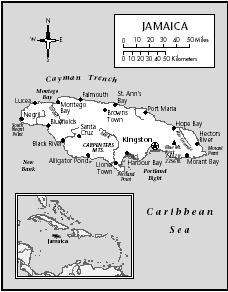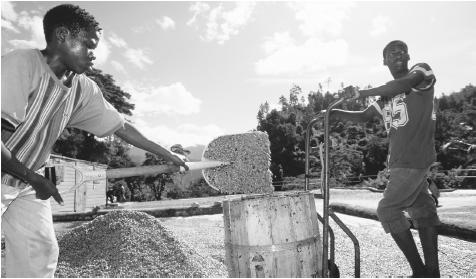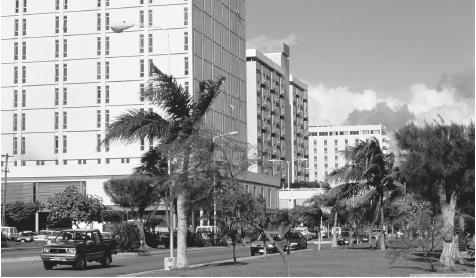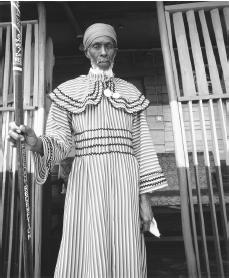Jamaica
Culture Name
Jamaican
Orientation
Identification. In 1494, Columbus named the island Santiago. The Spanish wrote the name used by the native Taino, "Yamaye," as "Xaymaca." The Taino word is purported to mean "many springs." The abbreviated name, "Ja" and the Rastafarian term "Jamdung" (Jamdown) are used by some residents, along with "Yaahd" (Yard), used mainly by Jamaicans abroad, in reference to the deterritorialization of the national culture.
Location and Geography. Jamaica, one of the Greater Antilles, is situated south of Cuba. Divided into fourteen parishes, it is 4,244 square miles (10,990 square kilometers) in area. In 1872, Kingston, with a quarter of the population, became the capital.
Demography. The population in 1998 was 2.75 million. Fifty-three percent of the population resides in urban areas. The population is 90 percent black, 1 percent East Indian, and 7 percent mixed, with a few whites and Chinese. The black demographic category includes the descendants of African slaves, postslavery indentured laborers, and people of mixed ancestry. The East Indians and Chinese arrived as indentured laborers.
Linguistic Affiliation. The official language is English, reflecting the British colonial heritage, but even in official contexts a number of creole dialects that reflect class, place, and social context are spoken.
Symbolism. The national motto, which was adopted after independence from Great Britain in 1962, is "Out of many, one people." In the national flag, the two black triangles represent historical struggles and hardship, green triangles represent agricultural wealth and hope, and yellow cross-stripes represent sunshine and mineral resources.
History and Ethnic Relations
Emergence of the Nation. Jamaica was a Spanish colony from 1494 to 1655 and a British colony from 1655 to 1962. The colonial period was marked by conflict between white absentee owners and local managers and merchants and African slave laborers. After independence, there was conflict between plantation and industrial economic interests and those of small, peasant cultivators and landless laborers. In the 1920s, rural, landless unemployed persons moved into the Kingston-Saint Andrew area in search of work. The new urban poor, in contrast to the white and brown-skinned political, merchant, and professional upper classes threw in sharp relief the status of the island as a plural society. In 1944, with the granting of a new constitution, Jamaicans gained universal suffrage. The struggle for sovereignty culminated with the gaining of independence on 6 August 1962.
National Identity. Class, color, and ethnicity are factors in the national identity. Jamaican Creole, or Jamaica Talk, is a multiethnic, multiclass indigenous creation and serves as a symbol of defiance of European cultural authority. Identity also is defined by a religious tradition in which there is minimal separation between the sacred and the secular, manipulable spiritual forces (as in obeah ), and ritual dance and drumming; an equalitarian spirit; an emphasis on self-reliance; and a drive to succeed economically that has perpetuated Eurocentric cultural ideals.
Ethnic Relations. The indigenous Taino natives of the region, also referred to as Arawaks, have left evidence of material and ideational cultural influence. Jews came as indentured servants to help establish the sugar industry and gradually became part of the merchant class. East Indians and Chinese were recruited between the 1850s and the 1880s to fill the labor gap left by ex-slaves and to keep plantation wages low. As soon as the Chinese finished their indentured contracts, they established small businesses. East Indians have been moving gradually from agricultural labor into mercantile and professional activities.
The major ethnic division is that between whites and blacks. The achievement of black majority rule has led to an emphasis on class relations, shades of skin color, and cultural prejudices, rather than on racial divisions. Jamaica has never experienced entrenched ethnic conflict between blacks and Indians or Chinese.
Urbanism, Architecture, and the Use of Space
Settlement patterns were initiated by plantation activities. Lowland plantations, complemented by urban trade and administrative centers, ports, and domestic markets, were the hub of activity. As the plantations declined and as the population grew, urban centers grew faster than did job opportunities, leading to an expanding slum population and the growth of urban trading and other forms of "informal" economic activities.
Architecture reflects a synthesis of African, Spanish, and baroque British influences. Traces of pre-Columbian can be seen in the use of palm fronds thatch and mud walls (daub). Styles, materials, size, and furnishings differ more by class than by ethnicity. Since much of Caribbean life takes place outdoors, this has influenced the design and size of buildings, particularly among the rural poor. The Spanish style is reflected in the use of balconies, wrought iron, plaster and brick facades, arched windows and doors, and high ceilings. British influence, with wooden jalousies, wide porches, and patterned railings and fretwork, dominated urban architecture in the colonial period. Plantation houses were built with stone and wood, and town houses typically were built with wood, often on a stone or cement foundation. The kitchen, washroom, and "servant" quarters were located separately or at the back of the main building. The traditional black peasant dwelling is a two-room rectangular structure with a pitched thatched roof and walls of braided twigs covered with whitewashed mud or crude wooden planks. These dwellings are starting to disappear, as they are being replaced by more modern dwellings with cinder block walls and a corrugated metal roof.

Food and Economy
Food in Daily Life. A "country" morning meal, called "drinking tea," includes boiled bananas or roasted breadfruit, sauteed callaloo with "saal fish" (salted cod), and "bush" (herbal) or "chaklit" (chocolate) tea. Afro-Jamaicans eat a midafternoon lunch as the main meal of the day. This is followed by a light meal of bread, fried plantains, or fried dumplings and a hot drink early in the evening. A more rigid work schedule has forced changes, and now the main meal is taken in the evening. This meal may consist of stewed or roasted beef, boiled yam or plantains, rice and peas, or rice with escoviched or fried fish.
Food Customs at Ceremonial Occasions. Rice is a ubiquitous ceremonial food. Along with "ground provisions" such as sweet potato, yam, and green plantains, it is used in African and East Indian ceremonies. It also is served with curried goat meat as the main food at parties, dances, weddings, and funerals. Sacrificially slaughtered animals and birds are eaten in a ritual context. Several African-religious sects use goats for sacrifice, and in Kumina, an Afro-religious practice, goat blood is mixed with rum and drunk.
Basic Economy. Since the 1960s, the economy, which previously had been based on large-scale agricultural exportation, has seen considerable diversification. Mining, manufacturing, and services are now major economic sectors.
Land Tenure and Property. Land tenure can be classified into legal, extralegal, and cultural-institutional. The legal forms consist of freehold tenure, leasehold and quitrent, and grants. The main extralegal means of tenure is squatting. The cultural-institutional form of tenure is traditionally known as "family land," in which family members share use rights in the land.
Commercial Activities. The economy is based primarily on manufacturing and services. In the service economy, tourism is the largest contributor of foreign exchange. The peasantry plays a significant role in the national economy by producing root crops and fruits and vegetables.
Trade. The main international trading partners are the United States, the United Kingdom, Canada, and the Caribbean Economic Community. The major imports are consumer goods, construction hardware, electrical and telecommunication equipment, food, fuel, machinery, and transportation equipment. The major exports are bauxite and alumina, apparel, sugar, bananas, coffee, citrus and citrus products, rum, cocoa, and labor.
Division of Labor. In the plantation economy, African slaves performed manual labor while whites owned the means of production and performed managerial tasks. As mulattos gained education and privileges, they began to occupy middle-level positions. This pattern is undergoing significant change, with increased socioeconomic integration, the reduction of the white population by emigration, and the opening of educational opportunities. Blacks now work in all types of jobs, including the highest political and professional positions; the Chinese work largely in retail and wholesale trades; and Indians are moving rapidly into professional and commercial activities. Women traditionally are associated with domestic, secretarial, clerical, teaching, and small-scale trading activities.
Social Stratification
Classes and Castes. The bulk of national wealth is owned by a small number of light-skinned or white families, with a significant portion controlled by individuals of Chinese and Middle Eastern heritage. Blacks are confined largely to small and medium-size retail enterprises. While race has played a defining role in social stratification, it has not assumed a caste-like form, and individuals are judged on a continuum of color and physical features.
Symbols of Social Stratification. Black skin is still associated with being "uncivilized," "ignorant," "lazy," and "untrustworthy." Lifestyle, language, cuisine, clothing, and residential patterns that reflect closeness to European culture have been ranked toward the top of the social hierarchy, and symbols depicting African-derived culture have been ranked at the bottom. African symbols are starting to move up in the ranks, however.
Political Life
Government. Jamaica, a member of the British Commonwealth, has a bicameral parliamentary legislative system. The executive branch consists of the British monarch, the governor general, the prime minister and deputy prime minister, and the cabinet. The legislative branch consists of the Senate and the sixty-member elected House of Representatives. The judicial branch consists of the supreme court and several layers of lower courts.
Leadership and Political Officials. The two major parties are the People's National Party (PNP) and the Jamaica Labor Party (JLP). Organized pressure groups include trade unions, the Rastafarians, and civic organizations.
Social Problems and Control. The failure of the socialist experiment in the 1970s and the emphasis on exports have created a burgeoning mass of urban poor (scufflers) who earn a meager living in the informal, largely small-scale trading sector and engage in extralegal means of survival. Also, globalization has led to the growth of the international drug trade. The most serious problem is violent crime, with a high murder rate. Governmental mechanisms for dealing with crime-related social problems fall under the Ministry of National Security and are administered through the Criminal Justice System.
Military Activity. The military consists of the Jamaica Defense Force (which includes the Ground Forces, the Coast Guard, and the Air Wing) and the Jamaica Constabulary Force. Both branches include males and females. The military is deployed mainly for national defense and security purposes but occasionally aids in international crises.

Social Welfare and Change Programs
The social development system combines local governmental programs and policies, international governmental support, and local and international nongovernmental organization (NGO) participation. It is administered largely by the Ministry of Youth and Community Development. The social security and welfare system includes the National Insurance Scheme (NIS) and public assistance programs. NIS benefits include employment benefits; old age benefits; widow and widower, orphan, and special child benefits; and funeral grants.
Nongovernmental Organizations and Other Associations
Over 150 NGOs are active in areas such as environmental protection, the export-import trade, socioeconomic development, and education.
Gender Roles and Statuses
Division of Labor by Gender. Men are predominant in leadership positions in government, the professions, business, higher education, and European-derived religions and engage in physical labor in agriculture. Women work primarily in paid and unpaid in household labor, formal and informal retail trades, basic and primary education, clerical and administrative jobs, and social welfare.
The Relative Status of Women and Men. Traditionally, woman's place is in the home and women receive less remuneration than men. The appropriate place for men is outside the home, in agriculture, business, government, or recreation. This attitude is changing.
Marriage, Family, and Kinship
Marriage. There are two types of marriage patterns: the legally recognized and socially preferred Western-style monogamous union and the socalled consensual union. The selection of a spouse is made by individual choice, but in more traditional communities, the approval of parents and close relatives is sought. Among the Indians and Chinese, monogamous unions predominate. Traditionally, among African Jamaicans there has been a link between socioeconomic status and type of marriage, with the consensual union associated with the rural and urban poor and the legal union associated with economically stable, landholding peasants, and the middle and upper classes. A consensual union often occurs among young people, with

Domestic Unit. The domestic unit typically consists of a grandmother, a mother, and the mother's offspring from the current and previous unions. The father may be a permanent part of the unit, may visit for varying periods, or may be absent. Often the unit includes children of kin who are part of other households.
Inheritance. Inheritance generally passes bilaterally from parents to children and grandchildren. Among the poor, land that is inherited helps to maintain strong family and locality relationships.
Kin Groups. The concept of family applies to blood and nonblood kin who maintain an active, functional relationship with respect to material and social support. It is not limited to the household. Family relations are of great importance, and children of the poor often are shifted from household to household for support. Kin relations are traced bilaterally for four or five generations.
Socialization
Infant Care. The use of midwives is still popular, and breast-feeding is done in all the ethnic groups. A baby is named and registered within a few days of its birth, and soon afterward it is "christened." Infants typically sleep with the mother and are carried in her arms. A crying baby is rocked in the mothers arms and hummed to. As a baby ages, the parents and grandparents try to accommodate their expectations to the child's unique qualities; the baby is allowed to "grow into itself."
Child Rearing and Education. Firm discipline underlies child care until a child leaves home and/or becomes a parent. The mother is central, but all members of the household and other close kin have some responsibility in rearing a child. It is believed that the behavior of the pregnant mother influences what the child will become. Children are said to "take after" a parent or to be influenced by "the devil" or the spirits of ancestors. Children are given progressively demanding responsibilities from the age of five or six. For poor parents in all ethnic groups, the single most important route out of poverty is the education of their children. In more traditional settings, the child is "pushed" by the entire family and even the community. The national stereotype is that Indians and Chinese pay greater attention to their offspring, who perform better than blacks.
Higher Education. Higher education is considered essential to national success, and the parliament has established the National Council on Education to oversee higher education policy and implementation. Expenditures on education have continued to rise. There are two universities the University of the West Indies, and the University of Technology.
Etiquette
Politeness and courtesy are highly valued as aspects of being "raised good." They are expressed through greetings, especially from the young to their elders. A child never "backtalks" to parents or elders. Men are expected to open doors for women and help with or perform heavy tasks. Women are expected to "serve" men in domestic contexts and, in more traditional settings, to give the adult males and guests the best part of a meal.
Religion
Religious Beliefs. The Anglican church is regarded as the church of the elite, but the middle class in all ethnic groups is distributed over several non-African-derived religions. All the established denominations have been creolized; African-Caribbean religious practices such as Puk-kumina, revivalism, Kumina, Myalism, and Rastafarianism have especially significant African influences.
Religious Practitioners. Among less modernized African Jamaicans, there is no separation between the secular and the sacred. Afro-Jamaican leaders are typically charismatic men and women who are said to have special "gifts" or to be "called."
Rituals and Holy Places. Rituals include "preaching" meetings as well as special healing rituals and ceremonies such as "thanksgiving," ancestral veneration, and memorial ceremonies. These ceremonies may include drumming, singing, dancing, and spirit possession. All places where organized rituals take place are regarded as holy, including churches, "balm yards," silk cotton trees, burial grounds, baptismal sites at rivers, and crossroads.
Death and the Afterlife. Death is regarded as a natural transformation, and except in the case of the very old, its cause is believed to be the violation of a cultural norm, evil spirits, or envy. After a death, kin and community gather at the home of the deceased to lend support and assist in funeral preparations, which involve washing and tying the body. People gather at the home of the deceased each night until the burial in a ritual called "setup." Funerals are one of the most important African-Jamaican

Medicine and Health Care
Jamaicans use a mix of traditional and biomedical healing practices. The degree of use of traditional means, including spiritual healing, is inversely related to class status. Among the African Jamaicans, illness is believed to be caused by spiritual forces or violation of cultural taboos. Consequently, most illnesses are treated holistically. When traditional means fail, modern medicine is tried.
Secular Celebrations
Independence Day is celebrated on the first Monday in August. Other noteworthy holidays are Christmas, Boxing Day, New Year's Day, and National Heroes Day, which is celebrated the third Monday in October. Chinese New Year is celebrated.
The Arts and Humanities
Support for the Arts. The arts and humanities have a long tradition of development and public support, but state support has been institutionalized only since independence. Most artists are self-supporting.
Literature. Indians, Chinese, Jews, and Europeans brought aspects of their written tradition, yet current literary works are overwhelmingly African Jamaican. The oral tradition draws on several West African-derived sources, including the griot tradition; the trickster story form; the use of proverbs, aphorisms, riddles, and humor in the form of the "big lie"; and origin stories. The 1940s saw the birth of a movement toward the creation of a "yard" (Creole) literature.
Graphic Arts. The tradition of graphic arts began with indigenous Taino sculpting and pottery and has continued with the evolution of the African tradition. Jamaica has a long tradition of pottery, including items used in everyday domestic life, which are referred to as yabbah. There is a West African tradition of basket and straw mat weaving, seashell art, bead making, embroidery, sewing, and wood carving.
Performance Arts. Most folk performances are rooted in festivals, religious and healing rituals, and other African-derived cultural expressions. Traditional performances take the form of impromptu plays and involve social commentary based on the African Caribbean oratorical tradition ("speechifying" or "sweet talking"). Music is the most highly developed of the performing arts. There is a long tradition of classical music interest, but the country is best known for its internationally popular musical form, reggae. Jamaica also has a strong tradition of folk and religious music. Drama is the least developed performing art, but it has been experiencing a new surge of energy.
The State of the Physical and Social Sciences
There are physical and social science programs at the University of West Indies (UWI) and the Institute of Jamaica and its ancillary research bodies such as the African Caribbean Institute of Jamaica. The UWI has a medical school and a law school, and there is a University of Technology. Most social science research is done with support from the Institute of Social and Economic Research.
Bibliography
Alleyne, Mervyn. The Roots of Jamaican Culture , 1989.
Carnegie, Charles V., ed. Afro-Caribbean Villages in Historical Perspective , 1987.
Cassidy, Frederic. Jamaica Talk: Three Hundred Years of the English Language in Jamaica , 1971.
Chevannes, Barry. Rastafari: Roots and Ideology , 1994.
Curtin, Philip D. Two Jamaicas: The Role of Ideas in a Tropical Colony, 1830–1865, 1955.
Dance, Daryl C. Folklore from Contemporary Jamaicans , 1985.
Kerr, Madeline. Personality and Conflict in Jamaica , 1963.
Mintz, Sidney W. Caribbean Transformations , 1974.
Nettleford, Rex. Caribbean Cultural Identity: The Case of Jamaica , 1979.
Olwig, Karen Fog. "Caribbean Family Land: A Modern Commons." Plantation Society in the Americas , 4 (2 and 3): 135–158, 1997.
Rouse, Irving. The Tainos: Rise and Decline of the People Who Greeted Columbus , 1992.
Senior, Olive. A–Z of Jamaica Heritage , 1985.
Sherlock, Philip, and Hazel Bennett. The Story of the Jamaican People , 1998.
Smith, Michael G. The Plural Society in the British West Indies , 1974.
—T REVOR W. P URCELL
to me personally, I'm Jamaican by birth, but until now was ignorant about by birth heritage, thanks
You helped a grade 12 here fighting for her marks on her major project. :) Take care.
Thank you for putting this up. My family is from Jamaica, and growing up in Miami I was immersed in the culture. Interesting comments by those who are from Jamaica. Interesting mostly in how they differ! It's important to understand that ours are not the only impressions possible or correct. I am sure that some of your experiences as a Jamaican are a far cry from mine. And there's nothing wrong with that. When we let go of the notion that our opinions are the only ones that are correct, then we will be able to receive and learn from each other. May God give you the grace to do just that just like He's done for me!
Again, thank you for putting this up. It's good to see people trying to give a balanced history. May God bless you!
-SC
Thank you
a friend of ours dad passed away ( they are originally from Jamaica but @ present in the UK )
I was wondering if i am to bring something to family ( as in some cultures u bring flowers ,food or money )
tnx for your help
i wanna ask if jamaicans culture had a problem ?
Police Herbert Theodore Thomas-1856 to 1930, been forgotten by his country
Jamaica ? This man's history tells a story of giving Jamaica stability and safety in it's rural areas. The first man to explore the John Crow mountains and helped to stamp out "Obeah" & "Voodo" that was a menace to the country's progress. He also crossed the racial divide at that time by marring his 2nd black Jamaican wife. He also wrote two books which put Jamaica on the map, and much more contribution to his country than most men of his time. What has happened to our lost history. Very sad.
Also, while politeness is valued in some areas, you will find service in restaurants and stores quite surly. Now in school, teachers do expect you to stand up when talking to them in class and address them as "sir" and s on.
This article was helpful for a research question in one of my masters courses.
University of the West Indies (a regional institution)
University of Technology (U-Tech)
Mico University College
Northern Caribbean University (NCU)
University College of The Caribbean (UCC)
International University of the Caribbean (IUC)
Caribbean Institute of Technology (CIT)
Colbourne College
B&B University College
Caribbean Aerospace College
Western Hospitality Institute
Caribbean Aviation Training Center
Caribbean Maritime Institute(CMI
Edna Manley College of the Visual and Performing Arts
of a good education system with Libraries for Public use. Also Jamaica many things that made life better for the average home owner, long before places in North America. So be proud and stop looking backwards. Better the devil we have known, than the one we don't know. Preserving our past History is very important for our next generation. With my thanks, Gerald. Author of "A struggle to Walk with Dignity-The True story of a Jamaican-born Canadian 2008.
it helped mme a whole lolt thanks everyculture.com
Is there anything you could do to help me? I’ve tried the Jamaican Police website but they don’t say. I’ve tried the Jamaican Archives and they don’t reply. I’ve tried so many places but cannot find the answer anywhere.
Is there anyone reading this who is old enough to remember, please?
I loved reading about This beautiful culture
With lot of thanks.